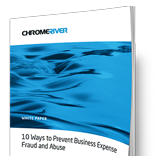Research shows that five percent of employees admit to submitting knowingly false or over-inflated expense claims, and on average receive 2,000 pounds per year in fraudulent expense reimbursements. How much could your company be losing to expense fraud if you don’t have the right processes in place?
Fraudulent employee expenses cost organizations more than 2.8 billion per year. Chrome River enables organisations to automate policy enforcement, requiring travelers to make sure their expenses are within an organisation’s guidelines before submitting them. The solution also has several technical layers to identify and eliminate fraudulent expense submission, protecting your organisation from liability.
Policy enforcement
Chrome River’s flexible business rules engine allows administrators to define parameters for the submission of expense claims, enforcing limits for any expense type. The rules engine’s unlimited configurability enables expense limits to be set down to business unit, or the individual user, if required.
These expense limits can further be defined as “soft” limits (where a submitter must provide an explanation before being allowed to submit an expense) or “hard” limits, which block the submission of an expense above a set limit. Automating these processes within the expense tool reduces the likelihood of friction between submitters and approvers.
Fraud prevention
While encouraging employees to submit expenses within policy is the preference, there will always be some who deliberately attempt to circumvent the rules. For some employees, this may be the occasional 20 pound cab receipt, whereas for others it could be a concerted effort to defraud their employer out of thousands of pounds. Here are some examples of how employees can submit fraudulent expenses:
- Submitting expenses for personal items, such as gasoline or food, as business expenses.
- Submitting expenses for unused items, such as canceled airline tickets, or registration fees for conferences that were never attended.
- Submitting receipt-less expenses for non-existent purchases, just below the organisation’s threshold for needing a receipt.
- Submitting a mileage report for a journey in which the submitter was a passenger.
- Adding tips to expenses (such as meals or taxi rides), either where they are already included in the cost, or where the amount on the expense receipt is more than what was left on the merchant receipt.
- Falsifying or manipulating receipts.
Chrome River understands that these situations happen often and can be detrimental to your bottom line, and has designed a number of safeguards to help you minimize fraudulent expenses:
- Duplicate expense checking: Ensure that the same receipt isn’t submitted by two individuals, or submitted twice by the same employee in separate expense claims.
- Dynamic approval routes and inline audit: Establish rules so that certain types of expense submissions trigger the report to be submitted for audit before being sent to the approver.
- Credit card matching: Reconcile credit card transaction data with expense submissions to ensure that submitted amounts match actual expenditures.
- Mapped digital mileage tracking: Track mileage electronically by using a map showing the route between start and finish, complete with total miles driven, enabling approvers to verify that mileage submitted for expenses is the same as that actually driven.
- Segregation of duties: Establish protocols to eliminate the possibility of collusion on expense approvals.
- Analytics and audits: Leverage analytics to identify trends and anomalies that could point to fraudulent spending patterns.
With Chrome River, you can prevent your organisation from becoming a victim of expense fraud, while ensuring that your travelers have the tools to adhere to your expense policy.
Chrome River AUDIT is definitely a real timesaver for me and my team. The Adjust Report feature has been very helpful for our employees as well.
